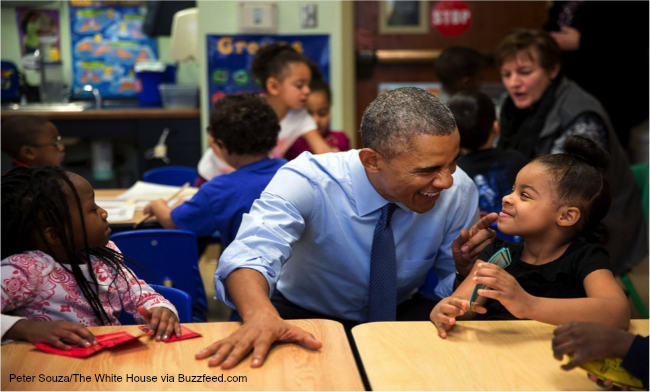As influencers of children we seek to inspire and connect in a meaningful, pivotal way, a way that makes a difference. Yet, do we ever really consider the connection a young person makes with us, and how that connection reverberates through us, extending to other lives?
Consider any unexpected human connection where, upon reflection, we as more “mature,” more “cultured” with more life experiences, learned a deep life lesson or realized an invaluable, personal truth from an unlikely source.
In his farewell address, President Obama challenged us to be the best versions of ourselves we could be. Evoking Atticus Finch from To Kill A Mockingbird, he challenged me–as a resident of this country–when he said “All Americans have to listen to people unlike themselves.”
While I agreed with his sentiment, I didn’t think it pertained to ME, particularly. I’m a teacher in a predominantly Latino school. I have close friends from the LGBTQ community. And I enjoy the company of friends with varied religious beliefs. Yet as evolved and enlightened as I thought I was, I really wasn’t. Then came a friend request on social media from a student on the other side of the world. Initially, I wondered what would I ever have in common with a high schooler in Iraq, of all places, but I accepted the request nonetheless, figuring I had nothing to lose… nothing to lose but my acute ignorance.
Through the course of our friendly exchanges, he described his life in Baghdad; a life vastly different than life here in the western world, life as you or I know it. As I listened without judgement, I discovered many commonalities between our cultures, although some of his daily obstacles remained quite foreign. I began to admire his steadfast humor in light of hardships that I suspect I wouldn’t have handled nearly as graciously at his age. I learned about resilience from a young man whose entire life has been war-torn. His zest for life baffled me, because it was and remains a life I would be hardpressed to find any joy in, much less an ounce of gratitude. Still, he embodied the innocence and idealistic perspective of youth.
The more we spoke, the more I thought about not just the connection I share with my students, but our connection, as adults, with children in general. Do we regard growth opportunities as strictly a one-way street? Or are we receptive to what we can learn from those who have not yet reached adulthood? Increasingly, I find myself more open to growth triggered from unexpected quarters, and, as a result, I’ve realized that there is a beautiful wisdom to be found in the “innocence of youth.”
Shaken out of my idealistic reverie, it dawns on me that–while they might not be confronting the same issues as their contemporaries in Baghdad–young people in the U.S. are overcoming their own equally significant battles. They walk into our schools yearning to connect just as much. We must be real, relevant and willing to learn from the children in our lives. The wealth of knowledge we might miss otherwise could very well astound us.


Ella koepke
Well said!
Steven L Christiansen
Excellent writing.
Alicia E Christiansen
Thanks for the read Steven.
Alicia E Christiansen
Thanks for taking the time to read it.
Ana
Well written Alicia, students teach us more than we can ever learn in a textbook, and thanks to technology we can reach people who not too long ago were unreachable and not thought of. The world is a wonderful place if we learn to live in harmony and accept our differences, we can learn so much from other cultures and realize there is more than meets the eye.
Alicia E Christiansen
Agreed Ana. Too often we overlook the wisdom of youth because of its innocence. Then couple youth with cultural differences and many of us can’t see past our age and our own culture to find the gems within another. I’ve learned much from my friends of all ages, cultures and religious views.